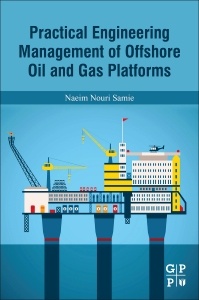Description
Practical Engineering Management of Offshore Oil and Gas Platforms
Author: Samie Naeim Nouri
Language: English
Subject for Practical Engineering Management of Offshore Oil and Gas...:
Keywords
Academic qualifications; Actual costs; Basis of design; Cash in�cash out; Change order; Compression; Data sheet; Deficit; Dehydration; Design philosophy; Document control center; Document weight distribution; Engineering disciplines; Engineering proposal; Expected income; Fail safe; Firefighting; Flare; Generator; Human factors; Incentives; Interdisciplinary review; Layout; Lifesaving; Living quarter; Major documents; Master document register; Mitigation measures; Offshore platforms; Oily water; Payment; Piping and instrumentation diagram (PID)Specification; Planning/project control; Production; Project budget; Salary; Satellite; Separator; Sweetening; Unit costs estimation; Vendor data controller; Wellhead; Working environment; Xmas Tree
Support: Print on demand
Description
/li>Contents
/li>Biography
/li>Comment
/li>
Practical Engineering Management of Offshore Oil and Gas Platforms delivers the first must-have content to the multiple engineering managers and clients devoted to the design, equipment, and operations of offshore oil and gas platforms.
Concepts explaining how to interact with the various task forces, getting through bid proposals, and how to maintain project control are all covered in the necessary training reference. Relevant equipment and rule of thumb techniques to calculate critical features on the design of the platform are also covered, including tank capacities and motor power, along with how to consistently change water, oil, and gas production profiles over the course of a project.
The book helps offshore oil and gas operators and engineers gain practical understanding of the multiple disciplines involved in offshore oil and gas projects using experience-based approaches and lessons learned.
Preface
Part I: Engineering Design of Offshore Platforms
Ch 1: Introduction to Offshore Platforms
1.1 Offshore Platform History
1.2 Oil and Gas Offshore Platforms Types
1.3 Importance of Engineering
1.4 Engineering Practice
Ch 2: Disciplines Involved in Offshore Platform Design
2.1 Architectural
2.2 Control
2.3 Electrical
2.4 HVAC
2.5 Instrument
2.6 Mechanical
2.7 Piping
2.8 Process
2.9 Safety
2.10 Structure
2.11 Telecommunication
Ch 3: Systems and Equipment for Offshore Platform Design
3.1 Process Systems
3.2 Utility Systems
3.3 Instrumentation and Control Systems
3.4 Safety Systems
3.5 Accommodation Systems
Part II: Management, Budgeting, and Scheduling of Offshore Platform Design
Ch 4: Balancing between Client and Task Force Engineers
4.1 Client Requests
4.2 Engineering Team Requirements
4.3 Disciplines/Engineers Mobilization and Requests
Ch 5: Handling Design Documentation
5.1 Master Document Register (MDR)
5.2 Interdisciplinary Checks / Discipline Interfaces
5.3 Document Control Center (DCC)
5.4 Vendor Data Controller (VDC)
5.5 Engineering Disciplines
5.6 General Items to be Checked in Quotation
5.7 Planning Department
Ch 6: Proposal Preparation
6.1 Familiarizing with Proper Requirements
6.2 Approximate Costs
6.3 Proposal Preparation Organization
6.4 Man Hour Weight Distribution
6.5 Unit Costs Calculation
6.6 Miscellaneous Costs
6.7 Changes / Variation Orders
Ch 7: Planning the Project Budget
7.1 Introduction
7.2 Budget Proposal
7.3 Monthly Planning
7.4 Expected Income and Deficits
7.5 Expected Deviations
7.6 Proposals and Incentives
References
Index
- Delivers the first ever must-have content to the multiple engineering managers and clients devoted to the design, equipment, and operations of offshore oil and gas platforms
- Contains rules of thumb techniques to calculate critical features on the design of the platform
- Includes practical checklists for project estimates and cost evaluation for effective project execution in budgeting and scheduling
- Helps offshore oil and gas operators and engineers gain practical understanding of the multiple disciplines involved in offshore oil and gas projects using experience-based approaches and lessons learned
These books may interest you

Advanced Marine Structures 160.25 €



